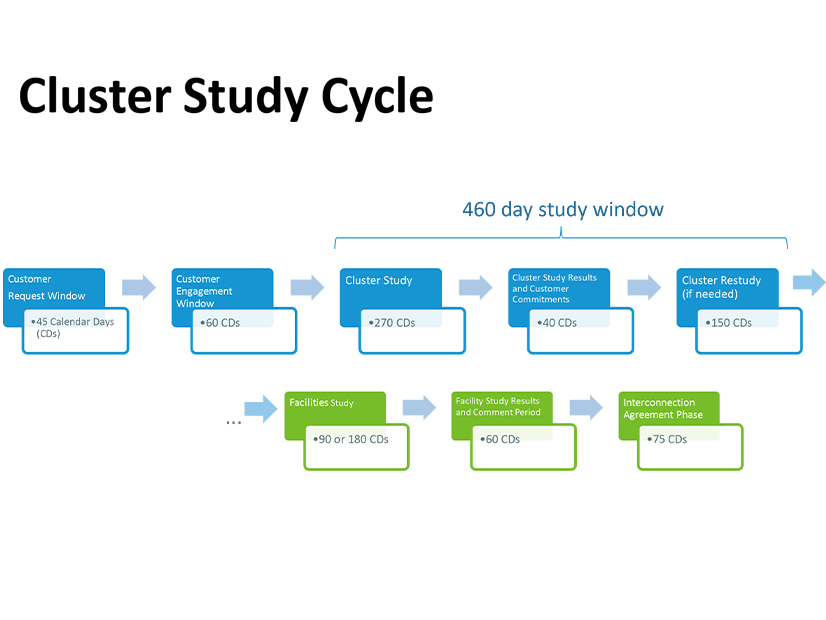ISO-NE is pursuing an alternative compliance pathway on FERC Order 2023 regarding storage resource interconnection, hoping to sidestep the need for “control technology,” the RTO told the NEPOOL Transmission Committee on Tuesday.
The all-day meeting ran nearly two hours longer than scheduled because stakeholders had so many questions on the proposed “independent entity variation” the RTO said is allowed by the order, which FERC issued in July to revise its pro forma generator interconnection rules. (See FERC Updates Interconnection Queue Process with Order 2023.)
The proposed alternate approach would not require battery storage interconnection customers to install some kind of hardware or software preventing the battery from charging at times of elevated load. Instead, the RTO is proposing to “rely on security-constrained economic dispatch to govern the charging behavior in operations,” Al McBride of ISO-NE told the TC.
Order 2023 allows storage interconnection customers to indicate the conditions in which they plan to charge their resource, while requiring control technology to ensure that a resource sticks to its studied behavior, McBride said.
“ISO believes that this approach is inconsistent with ISO-NE markets and would introduce significant operating inefficiencies compared with a more straightforward approach that is available to the region,” McBride said, adding that FERC’s approach fails to account for the addition of other storage resources at the same location and may limit charging more than is needed.
McBride also responded to stakeholder feedback on ISO-NE’s proposed cluster study interconnection process. He said transmission owners should be required to attend the scoping meetings with the interconnection customers, clarifying the RTO’s position on the issue. Order 2023 does not require TOs to attend these meetings, but several stakeholders have pressed ISO-NE to make this a requirement, saying it would save time and money and reduce the need for restudies.
Liz Delaney, of renewable energy developer New Leaf Energy, presented the TC with some compliance proposals aimed at minimizing the negative effects on projects currently in the late stages of the interconnection process.
Delaney said late-stage interconnection studies that have a “reasonable chance” of concluding prior to the start of the transitional cluster study should be able to proceed until 15 days prior to the start, likely April 30. If the late-stage studies fail to meet the 15-day-prior deadline, the projects should be given the option to enter the transitional cluster, Delaney said.
“These are mature projects whose development timelines will be delayed if they are pulled backwards into the transitional cluster study, impeding the region’s ability to meet its clean energy goals on time,” Delaney said, estimating this would impact about 15 projects totaling 2,700 MW of capacity.
Delaney added that ISO-NE should increase transparency around cluster study and cost allocation methodologies; tailor study deposits to project size; and calculate withdrawal penalties for projects in the transitional cluster study based solely on its costs, instead of those incurred in previous interconnection studies.
ISO-NE’s compliance filing is due with FERC by Dec. 5, if it is not granted extra time. NEPOOL has requested a 45-day extension, which would push the deadline to Jan. 19.
Acting on Transmission Studies
Brent Oberlin of ISO-NE gave the TC a high-level outline of the second phase of the RTO’s Longer-Term Transmission Planning project.
The first phase of the study led to the 2050 Transmission Study, which looks to identify the transmission upgrades needed to meet the region’s anticipated 2050 peak load. (See related story, ISO-NE Prices Transmission Upgrades Needed by 2050: up to $26B.)
ISO-NE is trying to streamline the process for the states to act on transmission needs identified in the long-term studies. Oberlin said the second phase of the process will establish “the rules that enable the states to achieve their policies through the development of transmission to address anticipated system concerns and the associated cost allocation method.”
Under the RTO’s proposal, the New England States Committee on Electricity would identify the transmission issues they want to address based on the findings of the studies. ISO-NE would then issue a request for proposals based on NESCOE’s requests and select the preferred solution. If needed, NESCOE would have the ability to terminate ISO-NE’s selected solution or submit alternate cost allocation methods.
Oberlin said ISO-NE is still considering whether some transmission projects should be assigned to the incumbent TO in the area, as opposed to going through an open RFP process.
ISO-NE hopes to file the necessary tariff changes with FERC in the second quarter of 2024.




